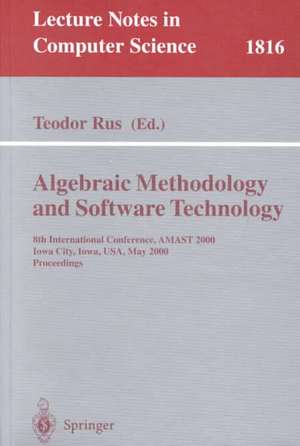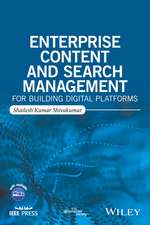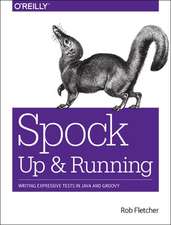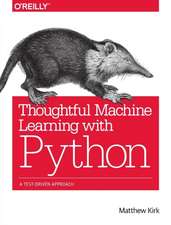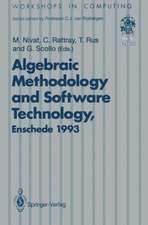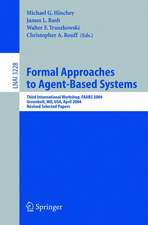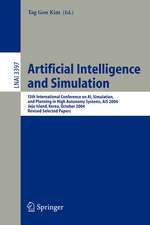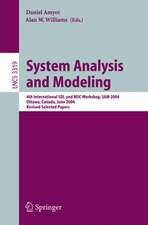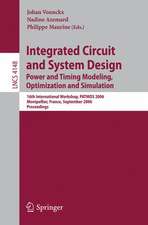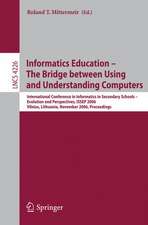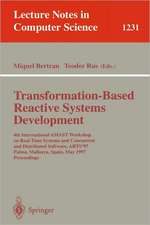Algebraic Methodology and Software Technology: 8th International Conference, AMAST 2000 Iowa City, Iowa, USA, May 20-27, 2000 Proceedings: Lecture Notes in Computer Science, cartea 1816
Editat de Teodor Rusen Limba Engleză Paperback – 3 mai 2000
Din seria Lecture Notes in Computer Science
- 20%
 Preț: 1061.55 lei
Preț: 1061.55 lei - 20%
 Preț: 341.95 lei
Preț: 341.95 lei - 20%
 Preț: 369.12 lei
Preț: 369.12 lei - 20%
 Preț: 645.28 lei
Preț: 645.28 lei - 20%
 Preț: 591.51 lei
Preț: 591.51 lei - 15%
 Preț: 580.46 lei
Preț: 580.46 lei -
 Preț: 410.88 lei
Preț: 410.88 lei - 20%
 Preț: 504.57 lei
Preț: 504.57 lei -
 Preț: 381.21 lei
Preț: 381.21 lei - 20%
 Preț: 340.32 lei
Preț: 340.32 lei - 20%
 Preț: 1414.79 lei
Preț: 1414.79 lei - 20%
 Preț: 538.29 lei
Preț: 538.29 lei - 20%
 Preț: 583.40 lei
Preț: 583.40 lei - 20%
 Preț: 1075.26 lei
Preț: 1075.26 lei - 20%
 Preț: 238.01 lei
Preț: 238.01 lei - 17%
 Preț: 360.19 lei
Preț: 360.19 lei - 20%
 Preț: 438.69 lei
Preț: 438.69 lei - 20%
 Preț: 1183.14 lei
Preț: 1183.14 lei - 20%
 Preț: 596.46 lei
Preț: 596.46 lei - 15%
 Preț: 438.59 lei
Preț: 438.59 lei - 20%
 Preț: 655.02 lei
Preț: 655.02 lei - 20%
 Preț: 649.49 lei
Preț: 649.49 lei - 20%
 Preț: 309.90 lei
Preț: 309.90 lei - 20%
 Preț: 337.00 lei
Preț: 337.00 lei -
 Preț: 449.57 lei
Preț: 449.57 lei - 20%
 Preț: 310.26 lei
Preț: 310.26 lei - 20%
 Preț: 1024.44 lei
Preț: 1024.44 lei - 20%
 Preț: 579.30 lei
Preț: 579.30 lei - 20%
 Preț: 763.23 lei
Preț: 763.23 lei - 20%
 Preț: 453.32 lei
Preț: 453.32 lei - 20%
 Preț: 575.48 lei
Preț: 575.48 lei - 20%
 Preț: 585.88 lei
Preț: 585.88 lei - 20%
 Preț: 326.98 lei
Preț: 326.98 lei - 20%
 Preț: 825.93 lei
Preț: 825.93 lei - 17%
 Preț: 427.22 lei
Preț: 427.22 lei - 20%
 Preț: 763.23 lei
Preț: 763.23 lei - 20%
 Preț: 350.21 lei
Preț: 350.21 lei - 20%
 Preț: 307.71 lei
Preț: 307.71 lei - 20%
 Preț: 580.93 lei
Preț: 580.93 lei - 20%
 Preț: 340.32 lei
Preț: 340.32 lei - 20%
 Preț: 343.62 lei
Preț: 343.62 lei - 20%
 Preț: 583.40 lei
Preț: 583.40 lei - 20%
 Preț: 583.40 lei
Preț: 583.40 lei -
 Preț: 389.48 lei
Preț: 389.48 lei - 20%
 Preț: 353.50 lei
Preț: 353.50 lei - 20%
 Preț: 607.39 lei
Preț: 607.39 lei
Preț: 677.15 lei
Preț vechi: 846.43 lei
-20% Nou
Puncte Express: 1016
Preț estimativ în valută:
129.61€ • 134.80$ • 108.61£
129.61€ • 134.80$ • 108.61£
Carte tipărită la comandă
Livrare economică 14-28 martie
Preluare comenzi: 021 569.72.76
Specificații
ISBN-13: 9783540675303
ISBN-10: 3540675302
Pagini: 564
Ilustrații: XI, 545 p.
Dimensiuni: 155 x 233 x 30 mm
Greutate: 1.29 kg
Ediția:2000
Editura: Springer Berlin, Heidelberg
Colecția Springer
Seria Lecture Notes in Computer Science
Locul publicării:Berlin, Heidelberg, Germany
ISBN-10: 3540675302
Pagini: 564
Ilustrații: XI, 545 p.
Dimensiuni: 155 x 233 x 30 mm
Greutate: 1.29 kg
Ediția:2000
Editura: Springer Berlin, Heidelberg
Colecția Springer
Seria Lecture Notes in Computer Science
Locul publicării:Berlin, Heidelberg, Germany
Public țintă
ResearchCuprins
Education Day.- Invited Talk: A Software Engineering Program of Lasting Value (Abstract).- Invited Talk: Weaving Formal Methods into the Undergraduate Computer Science Curriculum (Extended Abstract).- Technical Meetings.- Invited Talk: Making Mathematical Methods More Practical for Software Developers (Abstract).- Step by Step to Histories.- Distance Functions for Defaults in Reactive Systems.- Generalizing the Modal and Temporal Logic of Linear Time.- Process Algebra versus Axiomatic Specification of a Real-Time Protocol.- Practical Application of Functional and Relational Methods for the Specification and Verification of Safety Critical Software.- Algebraic State Machines.- Meta Languages in Algebraic Compilers.- Random Access to Abstract Data Types.- A Monad for Basic Java Semantics.- A Global Semantics for Views.- Analysis of Downward Closed Properties of Logic Programs.- Invited Talk: ASM Formalware in the Software Engineering Cycle.- Process Calculi for Coordination: From Linda to JavaSpaces.- The Algebra of Multi-tasking.- A Causal Semantics for Timed Default Concurrent Constraint Programming.- Casl-Chart: A Combination of Statecharts and of the Algebraic Specification Language Casl.- Message Authentication through Non Interference.- Plugging Data Constructs into Paradigm-Specific Languages: Towards an Application to UML.- An ASM Semantics for UML Activity Diagrams.- Approximate Bisimilarity.- Time and Probability in Process Algebra.- A Modal Logic for Klaim.- Kleene under a Demonic Star.- Pointwise Relational Programming.- Towards a Toolkit for Actor System Specification.- Maude Action Tool: Using Reflection to Map Action Semantics to Rewriting Logic.- The Extensibility of Maude’s Module Algebra.- A Reuse-Oriented Framework for Hierarchical Specifications.-MIX(FL): A Kernel Language of Mixin Modules.- Behavioural Subtyping Relations for Object-Oriented Formalisms.- Applying Category Theory to Derive Engineering Software from Encoded Knowledge.- A New Logic for Electronic Commerce Protocols.- Extended Institutions for Testing.- Testing from Structured Algebraic Specifications.
Caracteristici
Includes supplementary material: sn.pub/extras
